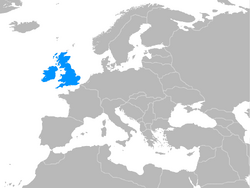| British Union | ||||
|---|---|---|---|---|
|
||||
| Motto: “God Save the British People" | ||||
| Capital | London | |||
| Largest city | London | |||
| Official languages | English | |||
| Demonym | British | |||
| Government | Fascist republic | |||
| - | Prime Minister | Oswald Mosley | ||
| Legislature | Parliament | |||
| Established | ||||
| - | Declaration | 2 November 1943 | ||
| Population | ||||
| - | estimate | 103,000,000 (including colonies) | ||
| Currency | Pound | |||
The British Union, sometimes called the Union of Greater Britain, was a Fascist government created as a client state after the United Kingdom was taken over by Nazi Germany in the Second World War. After the successful Operation Sealion, the Union of British Fascists was immediately contacted by the Germans, and its leader, Oswald Mosley, represented Britain in the Berlin Conference, where the end of the war negotiations were made. Part of the agreement included making a Fascist British regime, under Mosley, whose popular support grew. There was a resistance of former servicemen active from the end of the war in 1944 until 1948, when it was defeated. The Union lost many colonies of the former British Empire, but made up for it by increasing industrialism in what they had.
Militarily weak Ireland was forced to become a direct part of the Union by the Axis, shortly after the Conference. Australia was handed over to Japan, as a sign of "good will from the Union", but actually by order of Germany. The British Union largely managed its own affairs, though complied with German demands. They handed over Jews on the British mainland, who were sent to concentration camps in the former Netherlands. Also, the Union was forced to reprimanding funds, to fix what was destroyed in Germany, along with many other states. The Union's new military also aided Germany in Europe, putting down resistances.
History[]
Government[]
The Union had become a Fascist republic, with direct control over many colonies (though the number of British colonies was reduced significantly). It was led by a Prime Minister, who was Oswald Mosley, the leader of the Union of British Fascists, which was one of the few parties permitted in the country. Hitler gave the new British Fascist regime independence; allowing them to make their own decisions. However, German influence was still strong. The government spread the idea that the British were a Germanic people, and the German language had become one of the requirements to learn in school, with English. Nonetheless, few actually started using the German language, even within the government.
Economics[]
Demographics[]
Military[]
Territories[]
The Union controlled largely the same territories as the former British Empire, however, many colonies were lost to other countries. Germany took control of northern Egypt (Upper Nile), Italy took Tripolitania, Japan invaded Australia and Papua New Guinea, Spain took control of Gibraltar, the Greater Arab Republic took control of its territories in the Middle East (Iraq, Aden, and Oman). India became independent under Japanese oversight, and so did Burma. Hong Kong, Malaya, Sarawak, and Brunei were taken by Japan as well. However, the Union nonetheless maintained many of the Empire's old colonies, and tried to acquire new ones as well, in order to keep British nationalism going across the country.
List of colonies and dependencies[]
- Sudan
- Upper Nile (Southern Egypt)
- Ireland
- Nigeria
- Gambia
- Kenya
- Uganda
- Tanzania
- South Africa
- Rhodesia
- Sierra Leone
- Gold Coast
- Swaziland
- New Zealand
- Virgin Islands
- Seychelles
- Maldives
- Bermuda
- Cyprus


